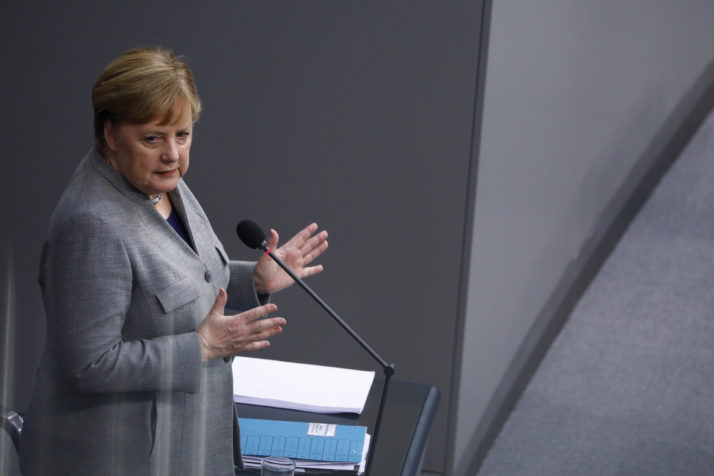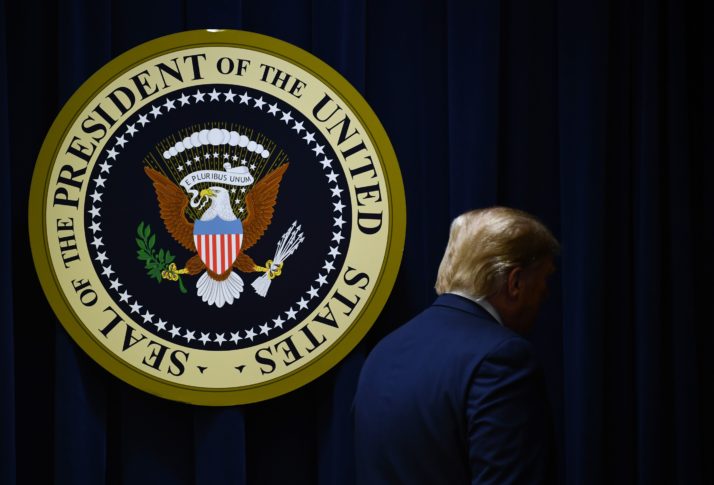BERLIN — Reckless, illegal, unhinged.
When it comes to finding adjectives to describe U.S. President Donald Trump’s assassination of Iranian military guru Qassem Soleimani, which prompted the Iranians to respond by launching missile attacks on bases in Iraq housing U.S. troops overnight, European officials have displayed rare unity. At least in private.
Behind the sober public pronouncements from Brussels and national capitals about the need for “de-escalation,” officials are seething.
Plus ça change? While Trump has been reviled by Europe’s establishment from the day he took office, his other major “outrages” — such as the decisions to pull out of the Paris climate accord and the Iranian nuclear deal or to impose tariffs on EU steel — were well-telegraphed.
No one saw the Iranian escalation coming. Within hours of Soleimani’s assassination, Europe’s shock over the Iranian general’s killing morphed into anger at Trump.
So far, the European response has focused on trying to placate Iran instead of displaying solidarity with the U.S.
One of the indirect victims of the U.S. strike may prove to be the transatlantic relationship.
Just how bad is it? Even as Iran’s supreme leader promised “severe” retaliation for the killing over the weekend, EU foreign policy chief, Josep Borrell, invited Iranian Foreign Minister Mohammad Javad Zarif for a sitdown in Brussels. The U.S., which recently placed sanctions on Zarif, won’t even grant him a visa to visit the United Nations.
Angela Merkel, Europe’s de facto supreme leader, responded to the crisis by arranging a “working meeting” later this week — in Moscow.
Berlin appears to have concluded that sitting down with Vladimir Putin (who met with Syrian strongman Bashar al-Assad this week to celebrate their success in crushing Syria’s civil war) would be more productive than a trip to Washington, on paper still Germany’s most important ally.

Angela Merkel responded to the crisis by arranging a “working meeting” later this week — in Moscow | Michele Tantussi/Getty Images
Former German Foreign Minister Sigmar Gabriel described the Soleimani attack as a “1914 moment.” The new leadership of Germany’s Social Democrats, Merkel’s coalition partner, called on the U.S. to remove its nuclear arsenal from the country.
Though other senior SPD officials, including former European Parliament President Martin Schulz, have endorsed such a move in the past, the timing of the latest demand underscored the degree of German unease over Trump’s course. Under Trump, the transatlantic relationship “has fundamentally changed,” SPD co-leader Norbert Walter-Borjans said on Tuesday.
No kidding.
This is how Borrell, who was Spain’s foreign minister before taking on the EU’s foreign policy portfolio, described Europe’s relationship with the U.S. in an interview with POLITICO last year: “Wherever you look there’s complete disagreement between the States and Europe,” he said. “It’s a divorce in values.”
In 2003, the Iraq War created a deep rift between the U.S. and both Germany and France, but other European allies, including the U.K., Italy and Spain, readily joined what became known as a “Coalition of the Willing.”
The dubious justification for that ill-fated foray is just one reason Europeans aren’t lining up to back the U.S. this time, even with rhetoric. The main reason is simple distrust of Trump.
France’s outspoken former ambassador to the U.S., Gérard Araud, cautioned Europeans not to be blinded by their dislike for Trump and lose sight of the underlying issues at hand. He noted this week that Europe has all the same concerns as the U.S. about Iran, from its support for terrorism to its nuclear aspirations.
So far, American efforts to convince Europeans of the bright side of Soleimani’s killing have been met with dropped jaws.
“Whatever we think of Trump, of the assassination of Soleimani, the basic reality predating the U.S. denunciation of the JCPOA was the aggressive behavior of Iran,” he said, using the acronym used to describe Iran’s nuclear deal with global powers.
Yet so far, the European response has focused on trying to placate Iran instead of displaying solidarity with the U.S.
On Tuesday, French President Emmanuel Macron, who tried in vain last year to bring Trump and the Iranian leadership together, spent about an hour on the phone with Iranian President Hassan Rouhani. Macron expressed his deep concern over the situation in the region and urged Iran “to refrain from taking any action that would aggravate rising tensions,” his office said in a statement.
Europe’s refusal to stand by America’s side on Iran hasn’t gone unnoticed in Washington.
„Frankly, the Europeans haven’t been as helpful as I wished that they could be,“ Secretary of State Mike Pompeo said over the weekend, adding that „the Brits, the French, the Germans all need to understand that what we did, what the Americans did, saved lives in Europe as well.“

As frustrated as Europe’s leaders are with what they perceive as Trump’s go-it-alone strategy, their own Iran strategy has gone nowhere | Brendan Smialowski/AFP via Getty Images
So far, American efforts to convince Europeans of the bright side of Soleimani’s killing have been met with dropped jaws.
Europe’s worry is that a wider conflict in the Middle East could trigger deep economic and political disruption on the Continent itself. As Europe learned during Syria’s civil war, its geographic proximity to the region leaves it particularly exposed to conflicts there.
That reality begs the question of whether EU leaders — regardless of how unsavory they find Trump — can realistically decouple from the U.S. on issues like Iran.
As frustrated as Europe’s leaders are with what they perceive as Trump’s go-it-alone strategy, their own Iran strategy has gone nowhere.
Not even Rouhani’s announcement this week that Iran would take a further step away from the deal has convinced the Europeans that it’s dead.
Yet Europe has stubbornly stuck to it. Even after the U.S. pulled out the Iran nuclear deal in 2018 and Tehran flouted many of its provisions, Europe insisted it was still in place.
Not even Rouhani’s announcement this week that Iran would take a further step away from the deal has convinced the Europeans that it’s dead.
„It is important for us to make it clear once again that this agreement has not lost its value for us,” German Foreign Minister Heiko Maas said Tuesday following a meeting at the U.K. ambassador’s residence in Brussels with his counterparts from France and Britain.
If nothing else, the three European powers managed to agree that they agreed.
There was “great unity in the assessment of the situation and for a closely coordinated approach to upcoming contacts in order to contribute to a de-escalation,“ a diplomat close to the talks said.
Hans von der Burchard contributed reporting.
Source: politico.com
See more here: news365.stream






